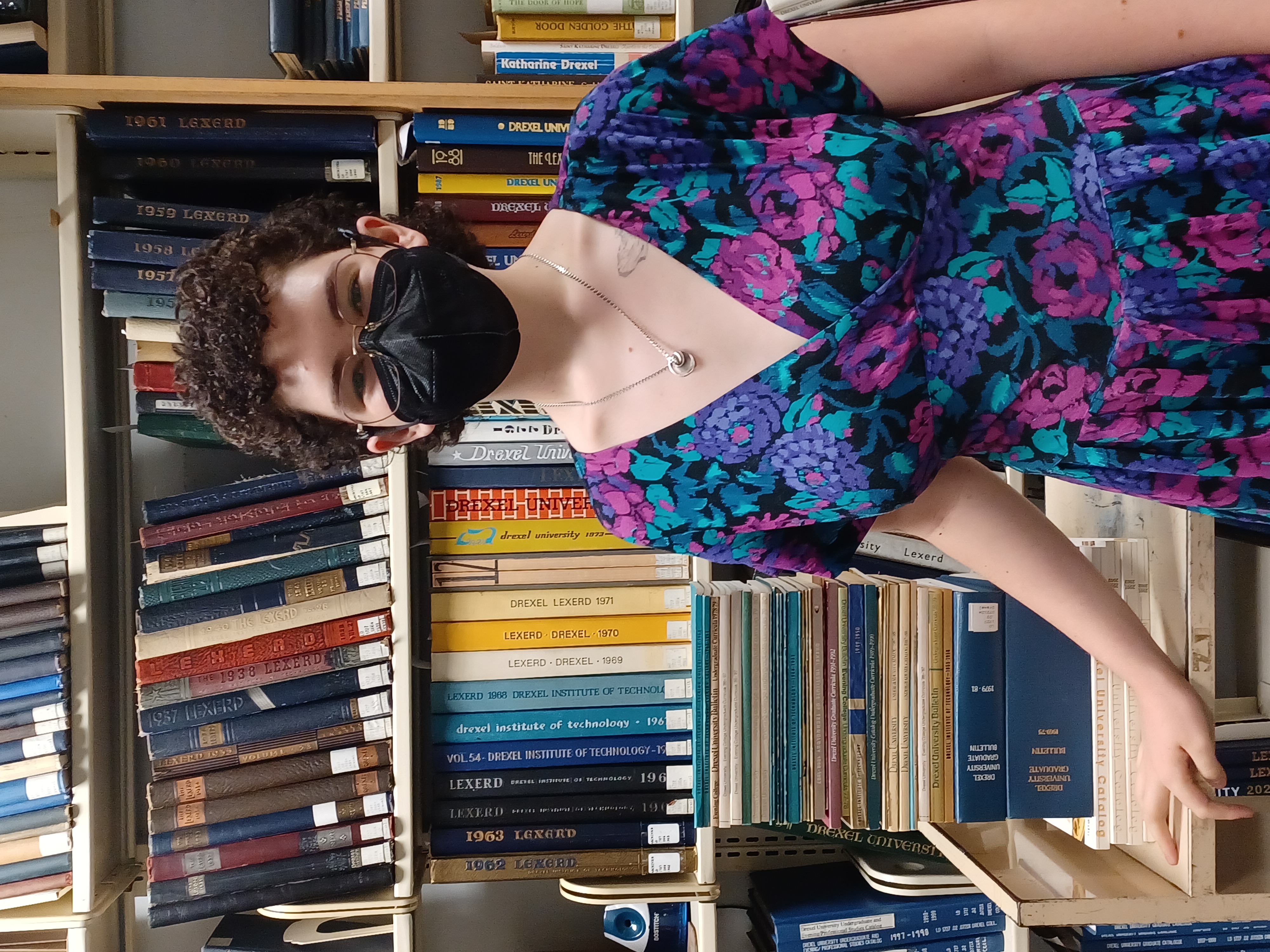Q&A with Hanna Pistorius, Drexel University Archives’ Archival Metadata Assistant
August 26, 2022
This month, Simon Ragovin, Drexel University’s Archives Technician, sat down with Hanna Pistorius (they/them), the University Archives’ current co-op student, to find out what they have learned during their spring/summer 2022 co-op experience.
Over the course of their co-op, Hanna scanned several decades’ worth of course catalogs, prepared them to be uploaded as PDFs, created the descriptions for each years’ catalogs, and uploaded them to the Drexel University Archives’ (DUA) digital repository. The course catalogs are one of the Archives’ most frequently used collections and are helpful sources for a variety of researchers. As a result of Hanna’s work, the first 77 years’ worth of Drexel’s course catalogs can be accessed online. These cover 1892 to 1969, the last year that Drexel was Drexel Institute of Technology before it was officially renamed Drexel University in 1970.
Hanna is an environmental studies major graduating in June 2024. They moved to Philadelphia from Pittsburgh, PA to attend Drexel University. Prior to this co-op, they had experience primarily in arts education and have research interests in the history of botany and historiography.  Hanna Pistorius, the Drexel Archives' spring/summer 2022 co-op student
Hanna Pistorius, the Drexel Archives' spring/summer 2022 co-op student
Q: You’re an environmental studies major – what have you learned about the connections between archives and environmental science?
I’ve learned that the field of archives, like all fields of work, is influenced by the real natural changes we are facing with climate and natural disasters. Both physical and digital collections are at risk for damage or destruction by weather events like floods, fires, and extreme temperatures. Much of environmental science is shifting into the mode of not only tracking and trying to prevent extreme climate change, but also figuring out how to preserve systems, people, and objects as extreme weather increasingly occurs. Bringing these together, practical considerations of disaster preparedness become central. For example, what vendors supply emergency supplies [necessary to limit damage to archival material after a catastrophe], or how can consistent temperature and humidity be maintained when the power grid is interrupted?
Q: Has this co-op influenced your long-term goals? If so, how?
I’ve really enjoyed this co-op and learned a lot through it. I had never considered working in archives nor known much about them before this position but looking back it is a logical progression of my interests and strengths. I have a strong interest in the history of botany and natural science generally. Gaining experience in digitization and metadata in this position has opened my eyes to the many possibilities for work that lies in the overlap between archives and environmental science.
Archival work is critical to many environmental and natural science institutions. Experience in archives can also transfer to managing the natural collections of such institutions. On the other hand, all archives must consider changing relationships to the environment and there are many projects centered on environmental topics that can come from archival collections. I hope to pursue some kind of career in archives as I’ve found I enjoy the work and have a tolerance for the less enjoyable aspects of it. Another influential factor is that, so far, I’ve enjoyed the people that are also drawn to archival work.
Q: What most surprised you about the Drexel University Archives?
I was honestly most surprised that the Drexel University Archives’ (DUA) collections are split between the W. W. Hagerty Library and One Drexel Plaza, an off-site storage site. It hadn’t previously occurred to me that the Archives would need that. I was also surprised that archives function differently from libraries and museums. I figured that archives would be a mix of the two. While they certainly share features with both types of institutions, archival collections are organized very differently from library collections and approach acquisitions in a manner much different from the tactics I associate with museums.
Q: What do you want other Drexel students to know about the DUA and archives in general? What are they missing out on?
I want other Drexel students to know that the DUA is a valuable resource for research, if you give enough time to use it. It can be easy to forget that Drexel as an institution often has direct connections to the topics of our projects and papers. The collections at the DUA can illustrate those connections. While online access is increasing, scheduling a reading room appointment can be very fruitful. Generally, students should know that using any archives for research requires some patience and an eye for context. Not having familiarity with archives-based research makes students miss out on deeper understandings of the way that phenomena and people we study now came to be.
For more information about the Drexel University Archives, visit www.library.drexel.edu/archives or contact archives@drexel.edu.